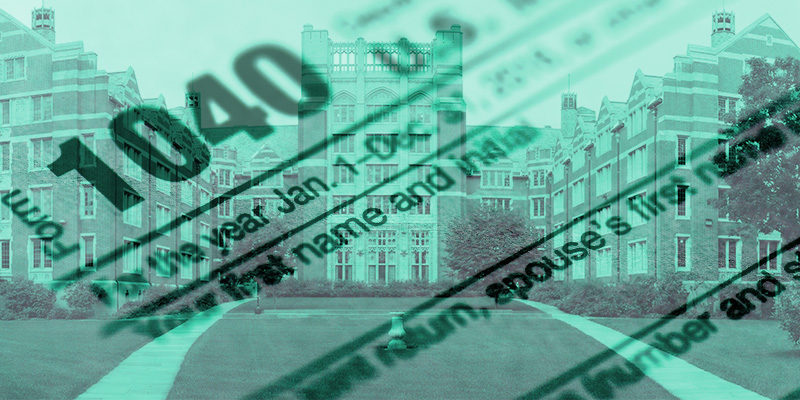
(Photos by Daderot/ Public Domain, and Meredith Nierman/WGBH News, illustration by Emily Judem/WGBH News)
The Republican tax plans include a new tax on large private college endowments that would affect at least six schools here in Massachusetts. Those colleges worry the tax would reduce how much financial aid they can give students in the future, while some economists say, instead, it would spur them to invest in students and research today.
At Wellesley College, two-thirds of students receive financial aid and the average grant totals about $40,000 a year. All of that money comes from the school's $2 billion endowment.
"Wellesley's endowment is heavily tilted toward scholarships," said Debby Kuenstner, who has managed Wellesley's endowment since 2009.
She says one-third of all endowment income goes to scholarships.
"When we admit students, we don't consider their ability to pay,” Kuenstner explained. “We admit the best students into our class and then we say, 'We are going to make it possible for you to come here.’"
Kuenstner estimates the proposed tax would cost Wellesley about one million dollars a year, hindering the College's financial support to students who can't afford the full $70,000 sticker price.
"A million dollars is serious money to us,” Kuenstner said. “This is a tax bill that says let’s invest less as a country in education, and let’s hope that those corporations that we give a big tax cut to are going to invest as wisely.”
WGBH's On Campus Radio sat down with Debbie Kuenstner, Wellesley College's Chief Investment Officer, to talk about how the Republican tax plan could impact schools with large endowments.
At a time when many Republicans are equating being college-educated with being elitist, supporters of the tax on Wellesley, Smith, Harvard, MIT, Amherst and Williams see it as an easy way to raise revenue.
Some economists say it would also encourage these schools to take less risk in the stock market and spend more on scholarships, research and teaching right now.
"You can view it like a nudge to value the present more," said economist Thomas Gilbert, who teaches finance at the University of Washington in Seattle.
Gilbert thinks the endowment tax is long-overdue and it will benefit higher education in the end.
"The hope is that we disincentivize the building of these enormous endowments a little bit, and this, therefore, incentivizes spending today on the things that the university is supposed to do — its core educational and research missions.”
Gilbert predicts private colleges will make up any losses by bringing in more alumni donations.
College leaders, though, say greater giving is not guaranteed, and they see the endowment tax as an attack on the schools that are best positioned to meet the financial needs of low- and middle-income students.
Terry Hartle, a senior advisor with the American Council on Education, which represents hundreds of colleges across the country, strongly opposes the plan.
"The proposal simply says, 'We are going to tax your endowments. Send a check each year to U.S. Treasury Department, Washington, D.C. Thank you very much.' That's less money for the institutions, more money for the Treasury Department," Hartle said.
Hartle said Republicans are pushing the new tax because of the current nationalistic mood of the country.
"We're living in a populist era and elite organizations and institutions tend not to do very well in such times," Hartle said.
On a recent afternoon at Wellesley, junior Nhia Solari is grabbing lunch in the student center. She says her family couldn't have afforded tuition without a generous scholarship.
"If I did not get financial aid, I don't think I could have come to Wellesley," Solari said.
Last month, when Wellesley president Paula Johnson sent an email to students addressing the GOP tax proposals, the potential impact cast a cloud over Solari and her friend's futures.
"One of my friends was like, 'I'm not going to be able to go to grad school now,'” Solari recalled. “Without financial aid, she won't be able to do that.'"
The tax on college endowments appears in both the Senate and House bills so a version is likely to be included in the final legislation.
The Senate plan would apply to about 30 private colleges with endowments worth at least $500,000 per student, including the six in Massachusetts.
The House plan would affect 70 schools with endowments totaling more than $250,000 per student. Two more in the state – Mount Holyoke College and the College of the Holy Cross — would be affected under this plan.
But higher education leaders worry the tax could eventually be expanded to cover hundreds of schools.
WGBH's Esteban Bustillos contributed to this report.
Earlier: GOP Tax Plan Could Cost Graduate Students Thousands Of Dollars, Undermine Research
Related: Senate Tax Overhaul Plan Keeps Tax On Large Endowments
Related: Higher Ed Leaders Question Priorities Of House Tax Overhaul Plan
Tune in Sunday night at 8 p.m. as WGBH's On Campus Radio takes a look at what the Republican tax plan could mean for higher education.










